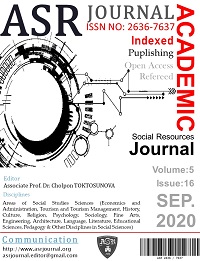Author :
Abstract
Geçmişten günümüze, zihin engelli bireylerin tanılama süreci sosyokültürel, ekonomik, siyasi özellikler ve bilimsel ilerlemelerle birlikte değişiklik göstermiştir. Bu bireylerin tanılama sürecinde dışlayıcı ve geleneksel bir anlayıştan, kapsayıcı ve çağdaş bir anlayışa, tıbbi tanılamadan eğitsel tanılamaya doğru bir geçişin olduğu görülmektedir.Tanılama, kapsam ve uygulama açısından dünyada ve Türkiye’de her geçen gün gelişmekte olan bir süreçtir. Tanılama, bireylerin zihin engelinin, zihin işlevlerinin ve uyumsal becerilerinin değerlendirilmesi için standartlaştırılmış ve bireysel olarak uygulanan araçlarla toplanan bilgilerin elde edildiği bir süreçtir. Zihin engelli bireylerin tanılama sürecinin bugünkü duruma nasıl geldiğini anlamak için tanılamanın özel eğitim içerisindeki yerini ve önemini, geçirdiği evrimi tarihsel süreç içerisinde ele almak gerekmektedir. Dünyada ve Türkiye’de tanılama sürecinin geçmişini ve bugününü Batı ülkeleri ile Türkiye açısından karşılaştırılarak ele alınması geleceğe yönelik çalışmaların yapılmasına katkı sağlayacaktır. Bu sayede, günümüzdeki tanılama sürecinin durumunu anlamak ve Türkiye’nin tanılama sürecindeki artılarını ve eksilerini belirleyebilmek için, tarihsel süreç içerisinde değerlendirilmesinde fayda vardır. Bu çalışmanın amacı, zihin engelinin dünyada ve Türkiye’de tanılanmasına yönelik sürecin sistematik olarak verilmesidir. Araştırmada 1600’lü yıllardan 2000’li yılların sonuna kadar Osmanlı Devleti’nde ve Türkiye Cumhuriyeti’nde zihin engelli bireylerin tanılama sürecinin olumlu yönde değişiklik gösterdiği ancak tanılama süreciyle ilgili birtakım sorunların olduğu görülmektedir. Bu çalışmanın ileri araştırmalara temel oluşturacağı ve tanılamayla ilgili yasal düzenlemelere rehber olacağı düşünülmektedir.
Keywords
Abstract
From past to present, the diagnostic process of intellectually disabled individuals has changed with socio-cultural, economic, political characteristics and scientific advances. It is seen that there is a transition from an exclusive and traditional understanding to an inclusive and contemporary understanding, from medical diagnosis to educational diagnosis in the diagnostic process of these individuals. Diagnostics in the world in terms of scope and practice in Turkey is an evolving process every day. Diagnostic is a process in which information is gathered through standardized and individually applied tools to evaluate individuals intellectual disability, intellectual functions and adaptive skills. In order to understand how the diagnostic process of intellectually disabled individuals has come to its present state, it is necessary to consider the place and importance of diagnosis in special education and its evolution in the historical process. History and the current state of the diagnostic process in Turkey and the world compared to Western countries to be addressed in terms of Turkey will contribute to the work done for future. Thus, to understand the current status of the diagnostic process and to determine the pros and cons of Turkey in the diagnostic process, there should be evaluated in the historical process. The aim of this study is to provide a systematic process of intellectual disability for the diagnosis in the world and Turkey. In the 1600s the Ottoman Empire until the end of the 2000s and intellectually disabled individuals of the Republic of Turkey of the diagnostic process has shown some positive changes, but there seems to be some problems related to the diagnostic process. It is thought that this study will form the basis for advanced research and guide legal regulations regarding diagnosis.





